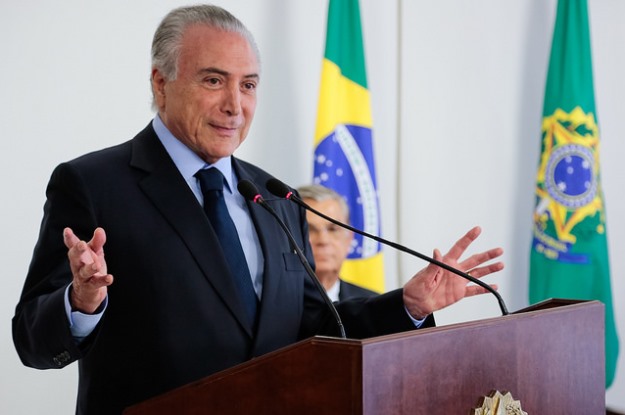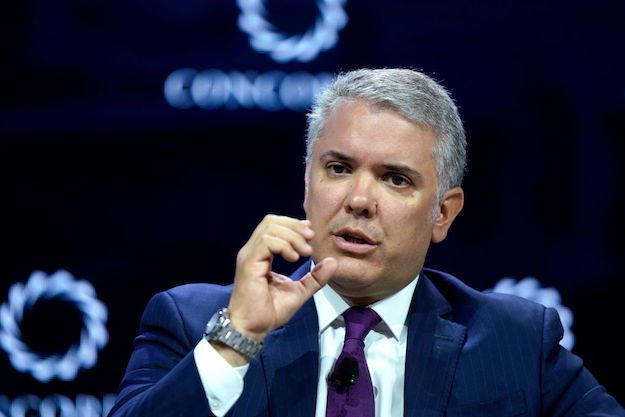On the surface, they seemed like two unrelated cases of bad luck.
Just as Brazil’s economy was showing fragile signs of recovery, a new corruption scandal erupted on March 17 threatening to paralyze the country’s $130 billion beef sector. Days later, the pillar of President Michel Temer’s market-friendly economic agenda, a reform to the social security system, ran into heavy resistance in Congress, forcing it to be watered down – and potentially shelved until later this year.
As CNN put it: “Brazil can’t catch a break.”
I was in Brasília last week as Temer and his government scrambled to downplay both setbacks. The beef scandal was an isolated case overhyped by police and the media, and no reason for the European Union, China and other countries to block Brazilian meat exports, they said. Some give-and-take on reforms is natural with Congress, and nothing to worry about, they said.
Yet for anyone who bothers to venture beyond the Esplanade of Ministries in Brasília, or the two main financial thoroughfares of São Paulo, an alternate narrative starts to emerge. Because if you talk to bus drivers and construction workers, or even some diplomats and legislators, one truth becomes evident:
Very few people trust, much less like, this government.
And that, rather than dumb luck, may be the core cause of Brazil’s latest problems.
This might sound like an impolitic thing to say. But in fact Temer has bragged about his unpopularity, wearing it as a badge of honor. Asked in an interview last September if he considered himself a “national leader” capable of building popular consensus around his agenda, he replied “Thank God I’m not!” explaining that he only needed Congress’ support to govern. “I’m not concerned about popularity,” he added, in case anyone didn’t get it. Since then, the 76-year-old career politician has stuck to his guns, spending nearly all his time horse-trading with legislators or seducing the business elite. The result has been a clear congressional majority, a huge rally in financial markets – and an approval rating of only 10 percent.
The latter would – arguably – not be a problem for a caretaker government merely hoping to hold Brazil together until elections in October 2018. But Temer has much greater ambitions. He is not only trying to raise the minimum retirement age to 65 (from an average of about 58), but also overhaul labor laws, simplify the tax code and pass “micro-reforms” aimed at improving Brazil’s horrid business climate – ranked 123 out of 190 countries by the World Bank, behind such luminaries as Vietnam, Kenya and Paraguay.
It was always an interesting bet: Would a widely-reviled government that took office under disputed circumstances following last May’s impeachment of Dilma Rousseff, and that has been besieged by corruption scandals ever since, be able to pass Brazil’s most ambitious economic reform agenda in 20 years?
Over the past 10 months, I have spoken to numerous people I respect who insist the answer to this question is “yes.”
Their argument: Temer won’t ever face another election, and he is a master negotiator in Congress. Thus, he is the ideal figure to pursue legislation that is unpopular, but necessary for Brazil to pull out of its worst recession ever.
A Matter of Trust
Investors have certainly bought into this theory, making Brazil’s stocks and currency among the world’s best-performing assets this year. And, I confess, I have sometimes found myself wanting to believe, too. Anyone who understands math knows Brazil’s current pension system is unsustainable. Anyone who has paid taxes in Brazil knows how insanely complicated that is. Temer’s economic team is truly top-notch.
But… well, then there are episodes like last week.
The beef scandal is the perfect example of what can go wrong when people don’t trust their government. Temer’s argument, that alleged misdeeds at two dozen plants do not implicate an entire industry of 6 million people, seems feasible. But everyone knows that officials in Temer’s government have attempted to undermine other corruption probes. Five ministers have resigned due to various allegations, and several current ministers face possible charges. Sixty-five percent of Brazilians said in a February poll they believe Temer’s government is just as corrupt as Rousseff’s, or more so.
Is it any wonder, then, that many Brazilians and foreigners alike are unprepared to accept the government’s assurances at face value? In one poll, an overwhelming majority of locals said they expect further revelations about corruption in the beef industry. It’s true that China, Egypt and Chile decided to reverse their restrictions on Brazilian beef over the weekend. But if there was any doubt about the essence of the problem still ahead, the European Union’s health and food safety commissioner, who will visit Brasília this week, told O Estado de S.Paulo newspaper: “The central question is credibility … Of course, all the official measures, transparency, all that will have to be improved … But we need a partner with credibility.”
The interviewer, clearly stunned, asked: “But do you believe that what’s in doubt is the meat sector, or the whole system?”
The commissioner replied: “Without a doubt, it’s not just one sector.”
The government’s dim reputation is also a factor in the recent trouble with pension reform. Legislators say they are coming under relentless pressure from labor unions, teachers and state workers to water down the new standards. Normally, at a time like this, Congress would lean on a president to explain, seduce and put his own reputation on the line. Instead, Brazilian congressmen are sensing danger as next year’s elections approach – and getting cold feet.
“The priority has become their own political survival,” Ribamar Oliveira, a reporter for Valor Econômico, warned in a column last week. He said legislators were worried that markets are far too optimistic about prospects for reform. The danger now is that, even if some kind of pension reform eventually passes, it will be too bland to prevent the system from collapsing.
There is a potential solution: Temer could decide that popularity matters after all. He could recognize that what Brazilians want more than anything else is clean, modern government; and overrule sectors of his Cabinet and party that are trying to subvert the rule of law. He could spend more time meeting with society at-large, and explaining why reforms are necessary.
That may sound like a tall order. But it may also be the difference between a successful transitional government – and two years of lost opportunities.









